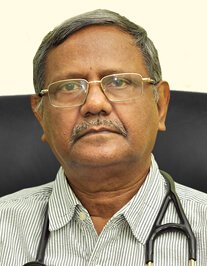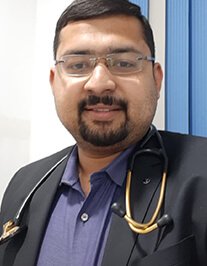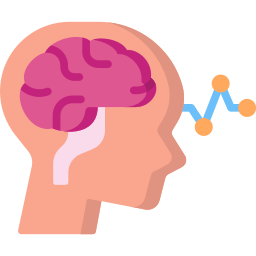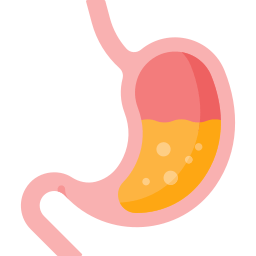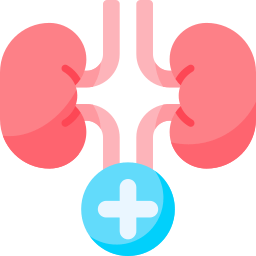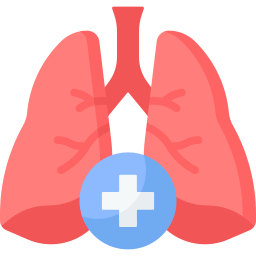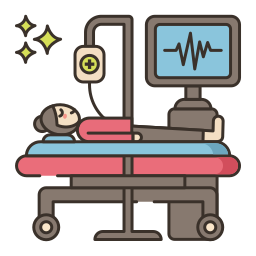Cardiac Medicine & Non-Interventional Cardiology
Overview
The Cardiac Medicine & Non-Interventional Cardiology Department at Charnock Hospital is committed to providing comprehensive care for heart health through advanced non-invasive techniques. Our experienced cardiologists specialize in the early detection, diagnosis, and management of a wide range of cardiac conditions. Utilizing cutting-edge technology and a patient-focused approach, we offer personalized care for everything from routine heart evaluations to the management of complex cardiovascular issues. Your heart’s health is our priority, and we are here to support you every step of the way.
Department Highlights

Consultation Services
Personalized assessments and expert advice from leading cardiologists to manage your heart health effectively.

HUTT (Head-Up Tilt Table Test)
A diagnostic tool used to evaluate unexplained fainting by monitoring how your body reacts to changes in position.

TMT (Treadmill Test)
A stress test that assesses how your heart responds to physical exertion, helping to diagnose conditions like coronary artery disease.

HOLTER Monitoring
A portable device worn for 24-48 hours that continuously records your heart’s electrical activity, detecting irregularities over an extended period.

ABPM (Ambulatory Blood Pressure Monitoring)
A method of measuring your blood pressure at regular intervals over 24 hours while you go about your daily activities, providing a more accurate assessment than single measurements.

ECG (Electrocardiogram)
A method of measuring your blood pressure at regular intervals over 24 hours while you go about your daily activities, providing a more accurate assessment than single measurements.
Why choose us?
At Charnock Hospital’s Cardiac Medicine & Non-Interventional Cardiology division, we deliver exceptional care through expert consultation and advanced diagnostics. Here’s what sets us apart:
Focused on Your Well-Being
Your heart health is our priority. We create a supportive environment where your treatment plans are personalized to meet your needs.
Expert Care from Leading Cardiologists
Our team comprises top cardiologists trained at prestigious institutions, ensuring you receive the highest level of expertise and accurate diagnoses.
Precise Diagnostic Technology
We use advanced non-invasive technologies such as HUTT, TMT, HOLTER, ABPM, and ECG for thorough and precise heart evaluations.
Our Expert Team
Testimonials
FAQ
How do I know if I need to see a cardiologist?
It is important to consult a cardiologist if you experience symptoms such as chest pain, shortness of breath, palpitations, dizziness, or unexplained fatigue. Additionally, if you have risk factors like high blood pressure, high cholesterol, diabetes, obesity, or a family history of heart disease, seeking a professional evaluation can help prevent potential complications and ensure early detection and management of heart-related issues. Regular check-ups are especially crucial for individuals with a sedentary lifestyle or those over 40 years of age.
What is a Holter Monitor, and why might I need one?
A Holter Monitor is a portable device that continuously records your heart’s activity over a 24 to 48-hour period. This extended monitoring allows doctors to detect heart rhythm irregularities or issues that may not be captured during a brief, standard ECG. It provides valuable insights into your heart’s behaviour during everyday activities, helping in the accurate diagnosis and management of various cardiac conditions.
Whats the difference between ECG & ECHO?
An ECG is used to detect heart rhythm issues and electrical abnormalities, while an Echocardiogram (Echo) provides detailed images of the heart’s structure and function, helping to identify problems with heart valves, pumping ability, or other conditions. Both tests are non-invasive and essential for diagnosing and monitoring heart health.
What is the purpose of the Treadmill Test (TMT)?
The TMT (Treadmill Test) is used to evaluate how your heart performs under physical stress. During the test, you walk on a treadmill while your heart rate, blood pressure, and ECG are monitored. It helps identify potential issues like coronary artery blockages, arrhythmias, and other heart conditions that may not be apparent at rest, providing valuable insights into your heart’s performance during exercise.
Can high blood pressure be diagnosed with ABPM?
Yes, ABPM (Ambulatory Blood Pressure Monitoring) offers a detailed profile of your blood pressure over a 24-hour period, including day and night measurements. This provides a more accurate and reliable diagnosis than a single blood pressure reading, helping to identify variations or potential issues that might be missed during a standard check-up.
What should I do if I experience symptoms of heart disease?
If you experience symptoms such as chest pain, shortness of breath, or unusual fatigue, it is essential to seek medical attention without delay. These could be warning signs of heart disease, and early diagnosis combined with prompt treatment is critical to effectively managing the condition and preventing further complications.



